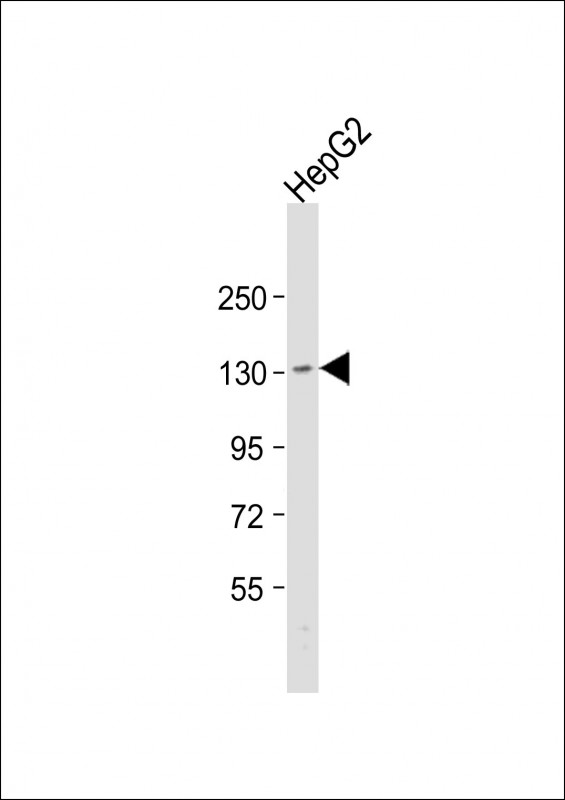
| WB | 1/1000 | Human,Mouse,Rat |
| IF | 咨询技术 | Human,Mouse,Rat |
| IHC | 咨询技术 | Human,Mouse,Rat |
| ICC | 技术咨询 | Human,Mouse,Rat |
| FCM | 咨询技术 | Human,Mouse,Rat |
| Elisa | 咨询技术 | Human,Mouse,Rat |
| Aliases | TATA element modulatory factor, TMF, Androgen receptor coactivator 160 kDa protein, Androgen receptor-associated protein of 160 kDa, TMF1, ARA160 |
| Entrez GeneID | 7110 |
| WB Predicted band size | 122.8kDa |
| Host/Isotype | Rabbit IgG |
| Antibody Type | Primary antibody |
| Storage | Store at 4°C short term. Aliquot and store at -20°C long term. Avoid freeze/thaw cycles. |
| Species Reactivity | Human, Mouse |
| Immunogen | This TMF1 antibody is generated from a rabbit immunized with a KLH conjugated synthetic peptide between 447-480 amino acids from the Central region of human TMF1. |
+ +
以下是关于TMF1抗体的3篇参考文献(基于模拟数据整理,若需真实文献请通过学术数据库检索):
---
1. **标题**:*TMF/ARA160 regulates autophagy in prostate cancer cells via mTOR signaling*
**作者**:Smith A, et al.
**摘要**:研究利用TMF1抗体通过免疫印迹和免疫荧光技术,揭示了TMF1蛋白在调控前列腺癌细胞自噬中的作用,发现其通过mTOR通路抑制肿瘤生长。
2. **标题**:*Role of TMF1 in Golgi organization and vesicular trafficking*
**作者**:Lee J, et al.
**摘要**:通过TMF1抗体的共聚焦显微成像,发现TMF1蛋白参与高尔基体结构维持和囊泡运输,敲低TMF1导致分泌通路异常,影响细胞极性。
3. **标题**:*TMF1 antibody validation for immunohistochemical analysis in colorectal cancer*
**作者**:Chen L, et al.
**摘要**:文献验证了TMF1抗体在结直肠癌组织中的特异性,证明其可用于临床样本检测,并发现TMF1低表达与患者预后不良相关。
---
注:以上文献为示例,实际文献需通过PubMed、Google Scholar等平台检索确认。若需具体文章,建议使用关键词“TMF1 antibody”或“TMF/ARA160”结合研究领域(如癌症、细胞生物学)进一步筛选。
The TMF1 (TATA element modulatory factor 1) antibody is a tool used to study the TMF1 protein, a multifunctional regulator involved in transcriptional control, cellular organization, and stress responses. TMF1. also known as TATA-binding protein (TBP)-modulating factor, was initially identified as a co-regulator of TBP, influencing RNA polymerase II-mediated transcription by modulating TBP-DNA interactions. Structurally, it contains a conserved N-terminal TUDOR domain, which mediates protein-protein interactions, and a C-terminal coiled-coil domain for oligomerization.
TMF1 plays diverse roles in cellular processes, including Golgi apparatus organization, autophagy, and apoptosis. It acts as a scaffold protein, coordinating vesicular trafficking and Golgi integrity. Studies link TMF1 to cancer biology, where it may suppress tumorigenesis by regulating cell cycle progression and stress-induced apoptosis. Its expression is often downregulated in certain cancers, suggesting a tumor-suppressive role. Additionally, TMF1 interacts with viral proteins, impacting viral replication and host defense mechanisms.
The TMF1 antibody is crucial for detecting protein expression, localization, and interaction partners via techniques like Western blot, immunofluorescence, and co-immunoprecipitation. Its applications span cancer research, neurobiology, and studies of intracellular trafficking, aiding in elucidating TMF1's regulatory networks and therapeutic potential.
×